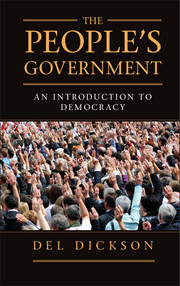Book contents
- Frontmatter
- Contents
- Acknowledgments
- Prologue
- 1 Liberty and Freedom
- 2 Freedom or Liberty?
- 3 Rights
- 4 Participation and Representation
- 5 Inclusion
- 6 Equality
- 7 Power
- 8 The Case against Democracy
- 9 The Case for Democracy
- 10 Building a Stable Democracy
- 11 Three Misconceptions about Democratization
- 12 How Democracies Die
- 13 How Democratic Is the United States?
- Glossary and Biographies
- Bibliography
- Index
- References
13 - How Democratic Is the United States?
Published online by Cambridge University Press: 05 August 2014
- Frontmatter
- Contents
- Acknowledgments
- Prologue
- 1 Liberty and Freedom
- 2 Freedom or Liberty?
- 3 Rights
- 4 Participation and Representation
- 5 Inclusion
- 6 Equality
- 7 Power
- 8 The Case against Democracy
- 9 The Case for Democracy
- 10 Building a Stable Democracy
- 11 Three Misconceptions about Democratization
- 12 How Democracies Die
- 13 How Democratic Is the United States?
- Glossary and Biographies
- Bibliography
- Index
- References
Summary
Despite free democracy’s roots in colonial New England, America’s Founders – apart from Jefferson and Paine – did not want the new nation to be a free or participatory republic. Their prejudices were openly admitted and well documented, although their anti-populist views are often exaggerated today to make them appear more narrow-minded and elitist than they were.
With few exceptions, the Founders and Framers believed in progressive Enlightenment principles. Yet despite their common attachment to liberty and liberal democracy, they were deeply divided as to the best course for the new republic.
They papered over their differences during the Revolution and established a loose confederacy under the Articles of Confederation, leaving the balance of power with the individual states, and most of the important underlying issues unresolved. When the republic began to founder, every state except Rhode Island sent delegates to Philadelphia in the summer of 1787 to strike a new deal. Once there, the delegates quickly agreed that the Articles were beyond salvation, and that the deteriorating political and economic situation demanded a new approach and a more robust federal republic.
The Framers loved liberty, but they craved stability. This led them to mistrust freedom and participatory democracy. In trying to explain the country’s new direction in The Federalist Papers, Hamilton, Madison, and Jay drew on their knowledge of political history and the new science of politics. They thought that they understood empirically why earlier democracies had all failed so quickly and miserably, and they were determined not to repeat past mistakes. As they saw it, free democracy’s fatal flaw is that it grants the majority a blank check, leading inevitably to majoritarian bullying, the suppression of minority rights and individual liberties, and uncontrolled factional conflict. These problems trap free and participatory democracies in a state of perpetual vibration between chaos and tyranny, making them inherently unstable.
- Type
- Chapter
- Information
- The People's GovernmentAn Introduction to Democracy, pp. 210 - 238Publisher: Cambridge University PressPrint publication year: 2014



